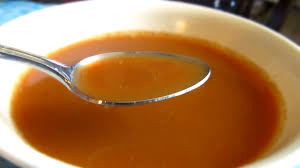broth
英 [brɒθ]
美 [brɑːθ]
- n. 肉汤;液体培养基
使用频率:

记忆方法
1. brew => broth "liquid in which something has been boiled".
2. 同源词:brew, broth, broil.
3. heat, boil, bubble => brew, broth, broil.
2. 同源词:brew, broth, broil.
3. heat, boil, bubble => brew, broth, broil.
中文词源
broth 肉汤
词源同brew, braise.
英语词源
- broth
-
broth: [OE] Broth comes ultimately from the Indo-European base *bhreu- or *bhru- ‘heat, boil’, which also produced brew and fervent. Etymologically, therefore, it means ‘liquid in which something has been boiled’. The notion of ‘heating’ has now disappeared, but it seems to have survived into the modern English period, as is shown by such compounds as snow-broth ‘melted snow’, first recorded at the end of the 16th century.
The Germanic form *brotham was borrowed into Vulgar Latin as *brodo, which came via Old French broez into 13th-century English as broys or browes. This survives in Scottish English as brose ‘type of porridge’, as in Atholl brose.
=> brew, fervent, imbrue - broth (n.)
- Old English broþ, from Proto-Germanic *bruthan (cognates: Old High German *brod), from verb root *bhreue- "to heat, boil, bubble; liquid in which something has been boiled" (source also of Old English breowan "to brew;" see brew (v.)). Picked up from Germanic by the Romanic and Celtic languages.
The Irishism broth of a boy, which is in Byron, was "thought to originate from the Irish Broth, passion -- Brotha passionate, spirited ..." [Farmer], and if so is not immediately related.
权威例句
- 1. You will need a pot of broth for poaching.
- 你需要一锅汤来煮。
- 2. Pour the broth through a strainer.
- 把肉汤倒进滤网滤一下。
- 3. Thicken the broth with the cornflour.
- 加玉米面使汤变稠。
- 4. Jeerers must be content to taste of their own broth.
- [谚]嘲笑人者必被人笑.
- 5. Too many cooks spoil the broth.
- 厨子太多反而把汤做坏.